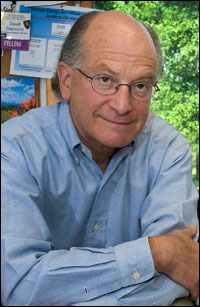BNL’s David Diamond Discusses Nuclear Energy Future at Manhattan Institute
April 3, 2012

David Diamond
Nuclear power continues to be a significant player in the energy marketplace but currently its growth is primarily overseas, according to David Diamond of Brookhaven’s Nuclear Science and Technology Department. That was Diamond’s message at a recent conference at the Manhattan Institute for Policy Research, a conservative think tank. The conference, titled “Power 2012 – Keeping The Lights On: What Role for Coal and Nuclear?” was organized by Robert Bryce, a senior fellow at the Manhattan Institute and author of Power Hungry: The Myths of "Green" Energy and the Real Fuels of the Future.
The goal of the conference (open only to invited participants) was a freewheeling discussion of the roles that coal and nuclear will play in meeting growing global electricity demands, although natural gas also figured prominently in the discussions. The attendees included representatives from financial, technical and media organizations. Diamond, the sole scientist among the speakers, made the case for the continued importance of nuclear in the global energy landscape.
“In spite of natural gas being more economical in many markets, in spite of the Fukushima catastrophe, in spite of the push for renewables, the nuclear energy sector continues to grow,” Diamond said. “Yes, the growth is primarily in Asia and Eastern Europe but it is very important from a global perspective and if you focus on just the U.S., it is still significant.”
While countries with an existing nuclear infrastructure like China, India, Russia, and Korea are moving ahead rapidly, other countries like the U.S., France, Finland, the U.K., Ukraine and Brazil are moving ahead, but less rapidly, Diamond said. Many other countries like Vietnam, United Arab Emirates, Indonesia, Turkey and Poland are developing the necessary infrastructure to support nuclear-generated electricity. Only in a few countries – Germany, Switzerland, Italy, and of course, Japan — has the effect of Fukushima been sufficient to curtail plans for nuclear energy. In the U.S., there are 104 existing nuclear plants, 85 of which have either completed or are in the process of completing license renewal to allow them to operate for 20 years beyond their original 40-year license. Four new units are starting construction in Georgia and South Carolina and one older unit is being completed in Tennessee. Twelve other units are in the queue for licensing.
In addition, small modular reactors (SMRs) being developed in the U.S. are designed to be attractive to smaller markets — for example in isolated areas, developing countries, or in other special circumstances, Diamond said. Their innovative designs, factory construction, and smaller size leading to smaller capital outlay, give them the potential to be competitive economically with larger plants.
Diamond does not believe that the Fukushima disaster has caused any slowdown in the growth of the nuclear sector in this country.
“People support nuclear energy but the economics are just not there when you have cheap coal and natural gas,” he said. “I was surprised to learn that we supply a growing portion of China’s coal. From the middle of the U.S., it’s cheap enough to get coal across the Pacific Ocean to China to make it worthwhile to the Chinese to buy our coal. And natural gas is now expanding into the electric generation sector.”
Historically, Brookhaven Lab has provided safety and design analysis to the Nuclear Regulatory Commission (NRC). The anticipated SMRs will be sufficiently different from the existing plants that a new regulatory process will be necessary. Diamond said that when vendors are ready with their designs, Brookhaven will be prepared to review documentation and perform confirmatory analysis of the safety of those designs.
At the conference, each of the six presenters spoke for only five to seven minutes while the balance of the time was spent in dialogue with an astute, well-informed audience.
“It was very well organized and I learned a great deal,” he said.
2012-2978 | INT/EXT | Newsroom









